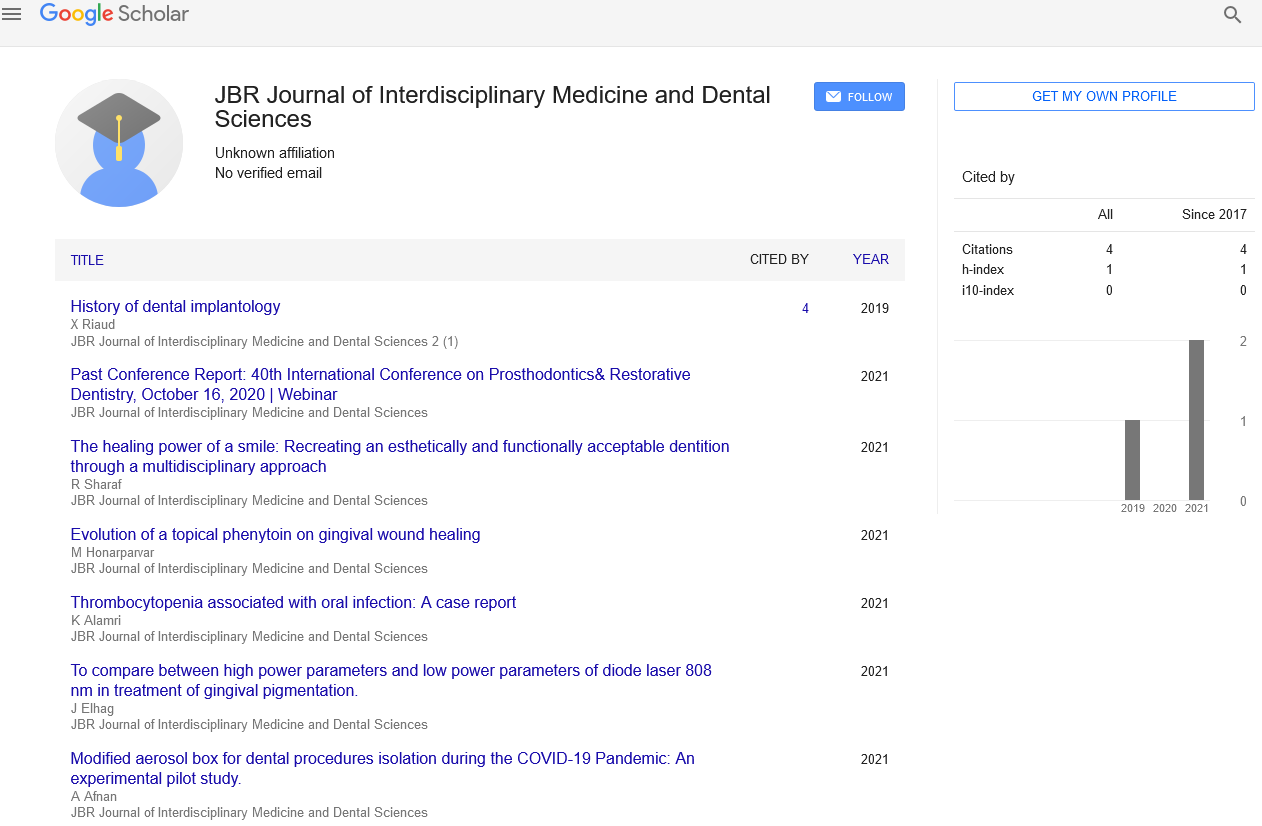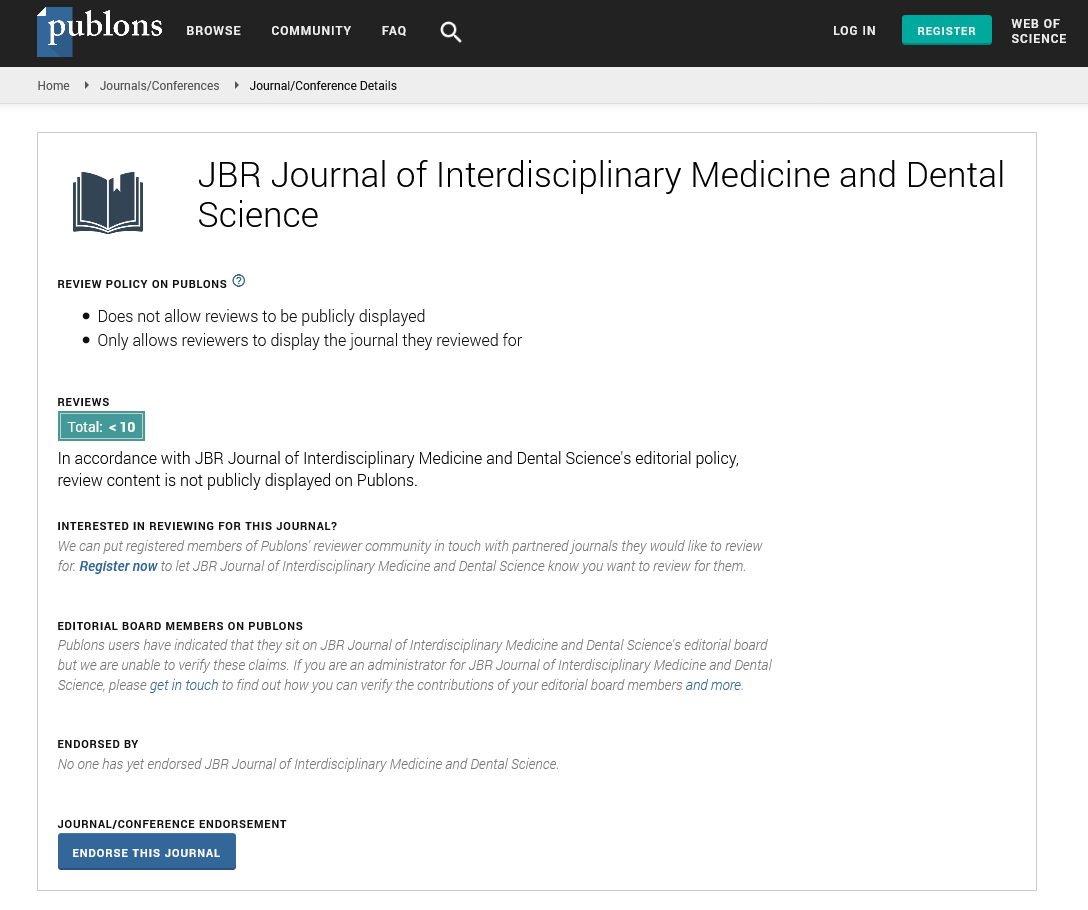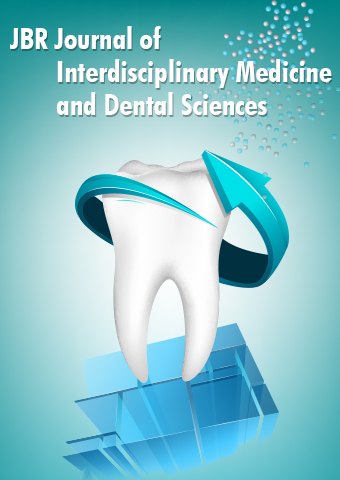Short Communication - JBR Journal of Interdisciplinary Medicine and Dental Sciences (2023) Volume 6, Issue 4
Integrative Oncology: A Holistic Approach to Cancer Care
Peter Jain*
Department of Dental medicine, Australia
Department of Dental medicine, Australia
E-mail: jain_peter2@gmail.com
Received: 1-July-2023, Manuscript No. jimds-23-108090; Editor assigned: 4-July-2023, PreQC No. jimds-23-108090 (PQ); Reviewed: 19-July-2023, QC No. jimds-23-108090; Revised: 24-July-2023, Manuscript No. jimds-23-108090 (R); Published: 31-July-2023, DOI: 10.37532/2376- 032X.2023.6(4).75-78
Abstract
Cancer remains a formidable challenge worldwide, necessitating the development of innovative and comprehensive approaches to optimize patient outcomes. Integrative oncology, a multidimensional and holistic paradigm, has emerged as a promising strategy that combines conventional cancer treatments with evidence-based complementary therapies. The primary objective of integrative oncology is to address the multifaceted needs of cancer patients, encompassing their physical, emotional, social, and spiritual dimensions. Complementary therapies, including mind-body techniques, acupuncture, nutrition support, herbal supplements, exercise, and supportive therapies, are integral components of integrative oncology. These therapies have demonstrated potential benefits in managing cancer-related symptoms and treatment side effects, fostering improved quality of life, and augmenting treatment tolerance. Central to the success of integrative oncology is the collaboration between medical professionals from diverse disciplines. By fostering effective communication and coordination among oncologists, surgeons, nurses, and complementary therapy practitioners, individualized and patient-centric treatment plans can be devised. An evidence-based approach forms the cornerstone of integrative oncology, emphasizing rigorous research and clinical trials to assess the safety and efficacy of complementary therapies in synergy with conventional cancer treatments.
Keywords
Integrative oncology • Cancer care • Complementary therapies • Holistic approach • Evidence-based
Introduction
Cancer, a pervasive and complex disease, continues to pose significant challenges to healthcare systems worldwide. Over the years, conventional cancer treatments, such as chemotherapy, radiations, and surgery, have made considerable strides in improving survival rates [1]. However, these treatments often come with various side effects and may not fully address the diverse needs of individuals on their cancer journey. In response to these limitations, integrative oncology has emerged as a promising and patient-centric approach to cancer care. Integrative oncology represents a paradigm shift in how we perceive and manage cancer [2]. It blends the best of both worlds by integrating conventional cancer therapies with evidence-based complementary treatments. The core principle of integrative oncology lies in recognizing the whole person beyond the disease itself. By considering the physical, emotional, social, and spiritual aspects of cancer care, this holistic approach seeks to optimize patient outcomes and enhance the overall quality of life [3]. In this paper, we explore the fundamental principles, complementary therapies, and the collaborative approach that defines integrative oncology. We delve into the growing body of evidence supporting its efficacy and discuss the potential benefits it offers to cancer patients. Moreover, we examine the role of multidisciplinary collaboration and the importance of evidence-based practices to ensure the highest standard of care [4]. By shedding light on the integrative oncology model, we aim to emphasize the value of patientcentered approaches in cancer care and inspire further research and implementation of this transformative approach [5]. As we explore the key elements of integrative oncology, we hope to foster a deeper understanding of its potential to improve the well-being and treatment outcomes of those affected by cancer, guiding us toward a more compassionate and comprehensive approach to cancer care.
Material and Methods
Cancer is a devastating disease that affects millions of people worldwide. Traditional cancer treatments, such as chemotherapy, radiation, and surgery, have made significant strides in improving survival rates. However, these treatments often come with various side effects and may not address the whole person’s well-being during the cancer journey [6]. This is where integrative oncology comes into play, offering a complementary and holistic approach to cancer care.
What is integrative oncology?
Integrative oncology is a field of medicine that combines conventional cancer treatments with evidence-based complementary therapies to improve patients’ overall quality of life. The primary focus of integrative oncology is to treat the whole person - not just the cancer cells - by addressing the physical, emotional, social, and spiritual aspects of cancer care [7]. Unlike alternative medicine, which may lack scientific evidence and is often used in place of conventional treatments, integrative oncology incorporates complementary therapies alongside standard cancer care to enhance its effectiveness and alleviate side effects.
The role of complementary therapies
Integrative oncology includes a wide range of complementary therapies, some of which have been studied extensively for their potential benefits in cancer care. These may include:
Mind-body techniques: Mindfulness meditation, yoga, and tai chi can help reduce stress, anxiety, and depression commonly experienced by cancer patients. These practices also promote better sleep and an improved sense of well-being [8].
Acupuncture: This ancient Chinese practice involves the insertion of thin needles into specific points on the body. Studies suggest that acupuncture can help manage cancer-related pain, nausea, and fatigue.
Nutrition and dietary support: Proper nutrition plays a crucial role in cancer treatment and recovery. Integrative oncology may involve personalized dietary plans to support the patient’s immune system, energy levels, and overall health [9].
Herbal supplements: Some herbal supplements may complement conventional treatments and support the body’s natural defense mechanisms. However, it’s crucial to consult with a qualified healthcare provider before using any herbal remedies, as they may interact with other medications.
Exercise: Physical activity has shown numerous benefits for cancer patients, including improved cardiovascular health, increased energy levels, and reduced fatigue [10].
Supportive therapies: Psychological counseling, support groups, and art therapy can provide emotional and social support during the cancer journey.
The collaboration between medical professionals
Integrative oncology works best when there is seamless collaboration between medical professionals from different disciplines. Oncologists, surgeons, nurses, and complementary therapy practitioners should communicate effectively to create individualized treatment plans for each patient.
Evidence-based approach
It’s essential to note that integrative oncology relies on evidence-based practices. Research and clinical trials are continuously conducted to evaluate the safety and efficacy of various complementary therapies in combination with standard cancer treatments.
Benefits of integrative oncology
The integration of complementary therapies into cancer care can provide several benefits, including:
Improved quality of life: Integrative oncology focuses on managing symptoms, reducing treatment side effects, and enhancing overall well-being, leading to a better quality of life for patients.
Enhanced treatment tolerance: By addressing side effects like pain, nausea, and fatigue, patients may tolerate conventional treatments better and experience less treatment interruption.
Psychological support: The emotional and psychological toll of cancer can be significant. Integrative oncology offers various mind-body techniques to help patients cope with stress, anxiety, and depression.
Empowerment: Integrative oncology encourages patients to actively participate in their treatment and recovery process, empowering them to take control of their health.
Potential treatment synergy: Some complementary therapies have shown promise in enhancing the effects of conventional cancer treatments, leading to potentially better treatment outcomes.
Discussion
Integrative oncology offers a valuable approach to cancer care by combining evidence-based complementary therapies with standard treatments. By addressing the physical, emotional, social, and spiritual needs of patients, this holistic approach aims to improve the overall well-being and quality of life of individuals on their cancer journey. As research in this field continues to grow, integrative oncology is becoming an increasingly important and respected aspect of comprehensive cancer care. In the face of cancer’s challenges, integrative oncology serves as a guiding light, reminding us that compassionate care and a comprehensive approach are fundamental to empowering patients and improving treatment outcomes. As we continue to embrace the principles of integrative oncology, we move closer to a future where the burden of cancer is lightened, and patients find solace in a more holistic and personalized cancer care experience.
Conclusion
Integrative oncology has emerged as a beacon of hope in the landscape of cancer care, offering a holistic and patient-centric approach that transcends the boundaries of traditional treatments. By integrating evidence-based complementary therapies with conventional cancer therapies, this multidimensional paradigm addresses the diverse needs of patients, encompassing not only their physical wellbeing but also their emotional, social, and spiritual dimensions. Through our exploration of integrative oncology, we have witnessed the potential benefits it brings to cancer patients. By incorporating mind-body techniques, acupuncture, nutrition support, herbal supplements, exercise, and supportive therapies, we can alleviate treatment side effects, enhance quality of life, and foster patient empowerment. The collaboration between medical professionals from various disciplines plays a pivotal role in tailoring individualized treatment plans, further elevating the standard of patient care. Crucially, evidence-based practices underscore the foundation of integrative oncology, ensuring that therapies are rigorously researched and supported by clinical trials. By embracing this scientific rigor, we can confidently advocate for the integration of complementary therapies alongside conventional treatments. As we conclude this exploration, it is clear that integrative oncology embodies the essence of compassionate and comprehensive cancer care. This transformative approach recognizes the profound impact cancer has on a person’s life and seeks to support patients through every step of their journey. However, while integrative oncology shows great promise, there is still much to learn and refine. Further research is needed to strengthen the evidence base and understand the full potential of this approach. Collaborative efforts between healthcare providers, researchers, and patients are essential in advancing the field and driving innovation in cancer care.
References
- Petersen PE, Yamamoto T. Improving the oral health of older people: The approach of the WHO Global Oral Health Programme. Community Dent Oral Epidemiol. 33, 81–92(2005).
- Nascimento GG, Leite FRM, Vestergaard P et al. Does diabetes increase the risk of periodontitis? A systematic review and meta-regression analysis of longitudinal prospective studies. Acta Diabetol. 55, 653–667(2018).
- Cassolato SF, Turnbull RS. Xerostomia: Clinical Aspects and Treatment. Gerodontology. 20, 64–77(2003).
- Tavares M, Calabi KAL, Martin LS. Systemic Diseases and Oral Health. Dent Clin N Am.58, 797–814 (2014).
- Preshaw PM, Alba AL, Herrera D et al. Periodontitis and diabetes: A two-way relationship. Diabetologia. 55,21–31(2011).
- Qiao Y, Wang Z, Li Y et al. Rheumatoid arthritis risk in periodontitis patients: A systematic review and meta-analysis. Jt. Bone Spine. 87, 556–564 (2020).
- Hussain SB, Botelho J, Machado V et al. Is there a bidirectional association between rheumatoid arthritis and periodontitis? A systematic review and meta-analysis. Semin Arthritis Rheum. 50, 414–422 (2020).
- Petersen PE, Bourgeois D, Ogawa H et al. The global burden of oral diseases and risks to oral health. Bull World Health Organ. 83, 661–669(2005).
- Kailembo A, Preet R, Williams JS (2017) Common risk factors and edentulism in adults, aged 50 years and over, in China, Ghana, India and South Africa: Results from the WHO Study on global AGEing and adult health (SAGE). BMC Oral Health. 17, 1–16.
- Glick M, Williams DM, Kleinman DV et al. A new definition for oral health developed by the FDI World Dental Federation opens the door to a universal definition of oral health. J Am Dent Assoc. 147,915–917(2016).
Indexed at, Google Scholar, Crossref
Indexed at, Google Scholar, Crossref
Indexed at, Google Scholar, Crossref
Indexed at, Google Scholar, Crossref
Indexed at, Google Scholar, Crossref
Indexed at, Google Scholar, Crossref
Indexed at, Google Scholar, Crossref
Indexed at, Google Scholar, Crossref


